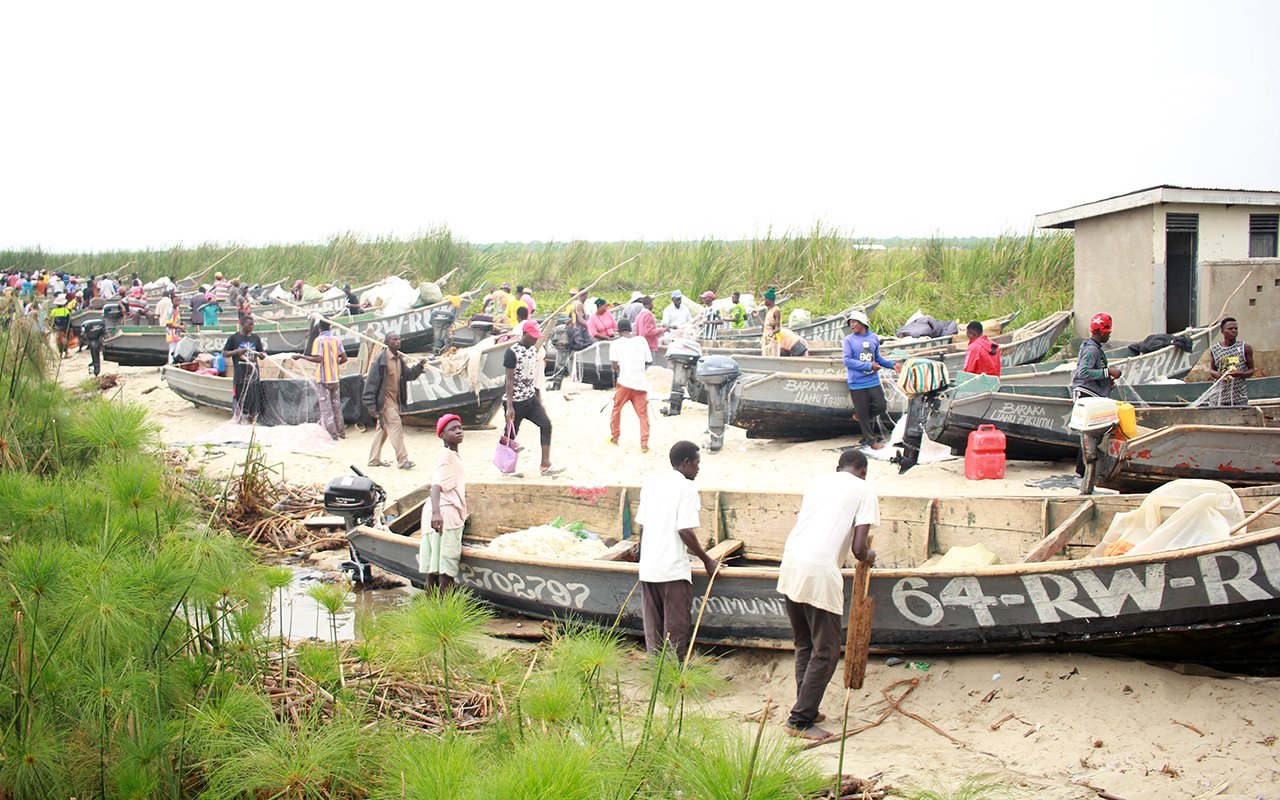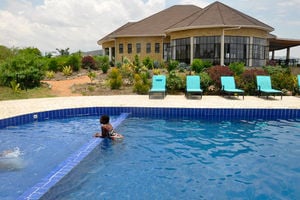
Fishermen arrange their boats before going fishing on Lake Edward. Below, a fisherman cleans his day’s catch. Photos/Trevor Lutalo
For a long time, the southern part of Queen Elizabeth National Park, Ishasha has been synonymous with tree-climbing lions. The Ishasha sector lies in the eastern Rift Valley, and its fabric is made of a beautiful savannah that is home to a host of beautiful yet untamed species. Amidst this natural wonder lies a birders’ paradise: Embogo Lodge tucked beautifully within nature.
This eco-friendly retreat, situated at Katooke, Kameme Parish in Kihihi Town Council in Kanungu District offers guests an authentic experience that goes beyond traditional game drives, a rare shift for tourism but a good step toward harnessing responsible and sustainable tourism.
As you leave the ‘Kampala concrete jungle’ the landscape changes to a serene countryside silhouetted by the golden sun ushering you into a dirt road leading to the magnificent expanse of the riparian forest and the wooded savannah. A journey through homes made of wattle and daub plus tiny towns dotted by human activity and learners returning home from a seemingly tiring day at school.
Hospitable
Upon arrival, the lodge appeared as if it had organically sprung from the surrounding wilderness. The thatched-roof cottages were curled up within a green cover of indigenous trees, blending seamlessly with the environment.
The high-roofed cottages were built with a blend of wood and brick walls covered with pebbles on the exterior. At the reception, I was greeted by a curio shop with African art and souvenirs to pick from.
Freshly squeezed fruit juice welcomed me to my home for the next few days as my hosts introduced me to our itinerary and the eco-friendly initiatives that Embogo Lodge championed. It became clear that this place was more than just a retreat; it was an invitation to rekindle my affair with nature and explore new communities.
My cottage, one of the seven en-suite wooden deck cottages, enjojo meaning Elephant, was placed in a private yonder from the reception. Its rustic theme blended with an African touch was a portrayal of the contemporary and old times. The rustling of leaves and the distant calls of birds were enough to summon me for the morning.
Community walk
Venturing into the neighbouring villages joined by other tourists led by our guide for the day, Allan Bananukye who briefed us about the locals and how they coexist with the wild animals. On the walk, we would earn a sneak peek into the daily lives, traditions, and challenges faced by the local communities.
We came across locals returning from their gardens laden with firewood or freshly harvested food, who greeted us in their native tongue, while we met others who had pitched camp in the plantations as they harvested cereals like rice, sorghum, and simsim.
Our guide revealed to us that many of them come from as far as Rukungiri (a neighbouring district) to take part in the lucrative cereal trade.
“For about four months, they build makeshift huts and watch their food grow as they protect it from birds and animals that come to feed,” he explains.
He tells us that many have come up with ‘scare tactics’ to keep the birds and animals at bay. “They gather small stones and place them in empty plastic bottles, connecting them with a string. This setup is used to scare away animals and birds attempting to approach the fields,” he says.
As we approached a farmer in the sweltering sun, we found him shirtless, hard at work harvesting rice. He introduced himself as Fred Bangirana and shared that he had been away from home for four months, tending to his garden with his wife and five children by his side
Mr Bangirana has been growing rice for the last 15 years.
“Every season, I rent an acre of land at Shs 200,000 to grow rice. I can take care of my family, the only challenge is the birds that always come here to feed and sometimes it gets too dry but we cannot give up,”

The fishing community
Lake Edward, locally called Rwitanzigye, is just a few clicks from the lodge. The village of Rwenshama, situated by the lake is a bustling area known for the wide variety of fish species that can be found there. Additionally, it is a prime location for observing hippopotamuses and crocodiles as they bask in the sun.
On the second day of our visit, we explored the fishing activities at the lake. In the early morning, boats returned with the previous night’s catch, and we observed as the fishers auctioned off their stock to eager buyers. Following this, the fish were carefully sorted, packed in baskets, and transported by trucks or motorcycles headed for the nearby towns. Some of the fish were also taken to specialised smoking shops where they were cleaned, dissected, and smoked for preservation during longer journeys.
Like many fishing communities, Rwenshama is affected by plastic waste from both visitors and locals, as our guide informed us. Mr Bananukye explained, “We have adopted a strategy to address the issue of plastic waste in the community. We have involved the residents in repurposing and upcycling plastic waste. We purchase the products they create, which serves as motivation for them. Additionally, we actively participate in cleaning efforts to encourage the community.”
The game drive
As we departed the fishing village at approximately 10 am, we eagerly embarked on an exhilarating game drive adventure. The refreshing morning air was tinged with excitement as we ventured into the untamed wilderness. Our guide skillfully navigated the rugged terrain, guiding us to a breathtaking spectacle - a herd of elephants gracefully traversing the vast landscape. The ambient sounds of snorting hippos permeated the atmosphere as we approached a nearby swampy watering hole, where these riverine creatures luxuriated in the serene waters.
Continuing our exploration, we were captivated by a troop of agile baboons gracefully swinging through the lush canopy of trees along the dirt road. As we ventured further, we were met with a mesmerising sight - majestic lions perched in the treetops, their presence and intense gaze leaving an indelible impression on us.
A herd of buffalo emerged from afar and became clearer with the help of binoculars, their commanding horns pointing at their strength.
The meals
The lodge’s culinary offerings were a harmonious blend of the rich and diverse flavours of traditional Ugandan cuisine alongside influences from around the world. Each meal was a celebration of the fusion of locally sourced, fresh ingredients with international culinary techniques.
Evenings at the lodge were a magical experience as we gathered around the crackling fireplace. Here, amidst the warmth and flickering light, tales of Ishasha’s untamed beauty and captivating adventures unfolded. The dinner menu was a testament to the culinary expertise of the chefs, offering a diverse array of options such as succulent grilled meats, flavourful stews, and an abundance of fresh, locally-grown vegetables. The skillful incorporation of indigenous spices and herbs resulted in an array of unique and unforgettable flavour profiles.
Quick facts
Mornings were a delightful affair on the deck, with the joyful melodies of weaver birds serenading us as they diligently attended to their nests. The air carried the enticing aroma of freshly brewed coffee, setting the scene for a delightful breakfast spread that included matooke pasted with groundnut stew, eggs, fluffy English pancakes, and an assortment of fresh, vibrant fruits.








